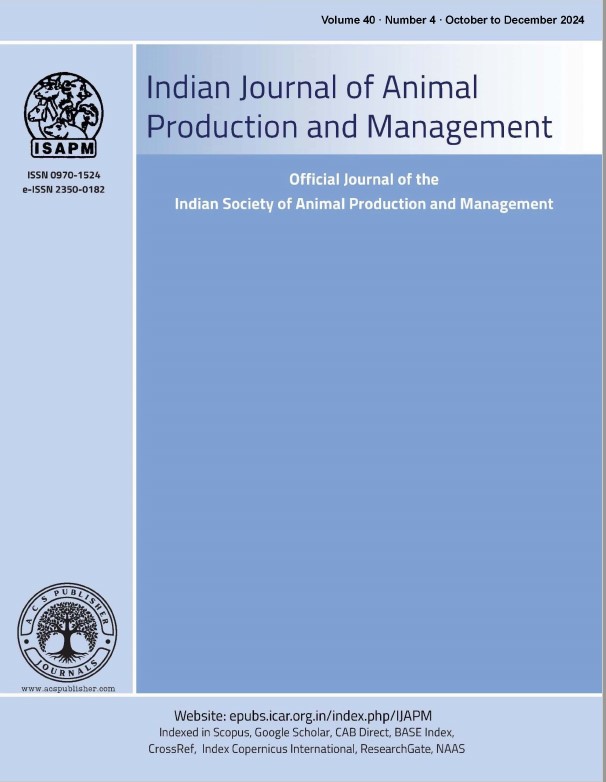Adoption of recommended calf rearing, milking and health care management practices by the cross bred cattle owners
DOI:
https://doi.org/10.48165/ijapm.2022.38.1and4.2Keywords:
Adoption, Cross bred cattle owners, Calf r earing, milking, Health care, Recommended management practicesAbstract
A field day survey was carried out in Jhunjhunu district of Rajasthan to study the adoption level of recommended calf rearing, milking and health care management practices by the cross bred cattle owners. A random sample of 320 cross bred cattle owners were selected from four blocks of the district and adoption level of recommended calf rearing, milking and health care management practices were studied. The study revealed that proper cleaning of mucous from mouth and nostrils (75.78%), cutting and disinfection of navel cord (66.72%), colostrum feeding to newly born calves within one to two hours after birth (65.31%) and trimming of calf hooves (47.34%) were adopted by majority of crossbreed cattle keepers. The overall adoption of calf rearing management practices were 50.40 percent. In adoption of milking management practices, it was observed that milking of cross bred cows with politely, gently and quickly (89.38%), washing of milking pail, udder and hands before milking (87.03%) regularity in milking hours (83.28%), milking at clean and separate dry place (77.50%) and keeping the milk production record (51.44%) were adopted by majority of respondents under milking management practices. The overall adoption of milking management practices was 60.76 percent. Regarding adoption of health care management practices, it was revealed that daily observation for signs of sickness (73.44%) control of external parasites (71.41%), proper treatment of sick animals by veterinarians (61.72%) and isolation of sick animals from healthy ones (52.50%) were moderately adopted by the crossbreed cattle owners. The overall adoption in health care management practices was 50.98 percent. It was concluded from the study that adoption level of milking management practices was quite satisfactory in comparison to calf and health care management practices but the recommended practices like dehorning and regular deworming of calves, full hand milking method and timely vaccination were less adopted practices by the respondents.
References
1. Anonymous. 2020. Dairying in Rajasthan-A statistical profile. Department of Animal Husbandry & dairying, Jaipur- Rajasthan.
2. Bhakar, S., Malik, J.S., Singh, S. and Dahiya, S. 2006. Comparative adoption level of farmers regarding improved animal husbandry practices in watershed and non-watershed villages. J. Dairying foods & H.S. 25 (1): 51-54.
3. Chaudhary, M. and Sharma, J.P. 2006. Contribution of women in the adoption of scientific cattle management practices in Barmer district of Rajasthan. J.Community Mobiliz. Sustain. Dev. 1(1):14-18.
4. Chauhan D.S., Kamble V.J., Padghan, P.V., Khandare, N.O. and Kamble, R.R. 2006. Dairy farming practice adoption in tribal area of Kinwat tehsil (Distric-Nanded). Indian J. Anim. Res. 40
(1):64-66.
5. Gupta, A., Hundal, J.S. and Singh, U. 2012 Effect of deworming on growth rate in crossbred calves. Indian J. Anim Prod. Mgmt. 20 (1-2):45- 46
6. Joshi. V., Solanki, D., Barotia, P. and Sisodia, S.S. 2012. Adoption of improved animal husbandry

